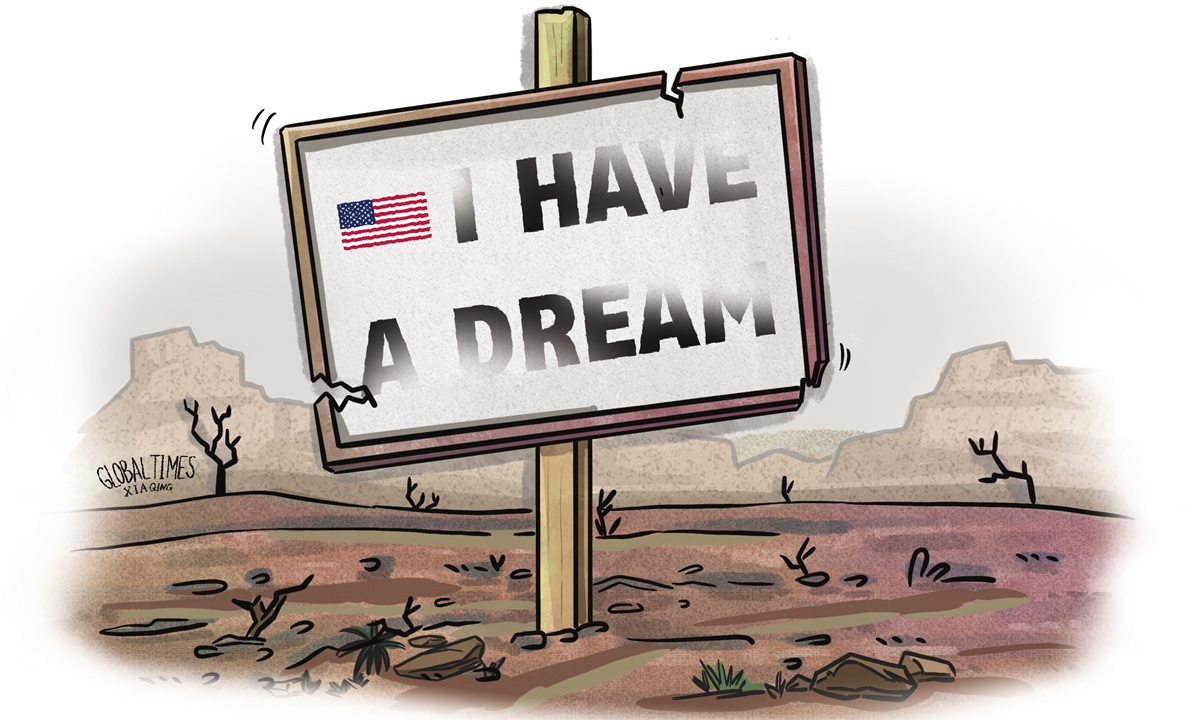
Illustration: Xia Qing/GT
It remains one of the signature events of the 1960s in the US: Dr. Martin Luther King's "I Have a Dream" speech. Delivered on August 28, 1963, it was Dr. King's most powerful reminder of what America was not, but still had a chance to be: A place where his children and all other children would "one day live in a nation where they will not be judged by the color of their skin, but by the content of their character."He noted that a century after the end of slavery, "the Negro still is not free. One hundred years later, the life of the Negro is still sadly crippled by the manacles of segregation and the chains of discrimination. One hundred years later, the Negro lives on a lonely island of poverty in the midst of a vast ocean of material prosperity."
Sixty years later, Dr. King's dream is no closer to reality. In fact, America might be further away now from achieving racial equality than it was during the 1960s. Most major politicians appear to not care. The majority of White Americans feel the same.
Black children (and the same can be said for Hispanic and Asian children) continue to be judged by the color of their skin in too many places across the country. Racism, perhaps the ugliest stain in America's history, is alive and well. A recent poll conducted by the USA Today newspaper and Suffolk University, located in Boston, Massachusetts, shows that 79 percent of Black Americans consider racism to be a major problem in the US but only 17 percent of White Americans thought the same.
Segregation might not be legal, but make no mistake, it still exists in the US. "White flight," in which Whites leave pockets of a city as it becomes more ethnically or racial diverse, shows no sign of ending. Research indicates that Whites persist in exiting areas where Blacks, Asians and Hispanics enter, indicating that the distrust of these people "who are not like us" guarantees that a kind of unofficial segregation carries on.
One of the effects of this unofficial segregation is that the economic disparity between White America and Black America remains in place. That "lonely island of poverty" continues to be the metaphorical home for too many of America's minorities. The Federal Reserve notes that White Americans hold 80 percent of the wealth in the US, a country in which the average White family has a net worth of roughly $1.3 million while the average Black family's net worth is approximately $350,000. Simplifying these dollar amounts, it is evident that Whites are better positioned to buy homes and cars, send their kids to college and go on vacation. They also are better prepared for an economic catastrophe, such as a husband or wife losing a job.
Knowing all of this, America certainly should have been a place acknowledging how much more needs to be done in order to make that dream a reality took place.
National Public Radio (NPR) provided a perhaps unintentional reminder of the blasé reaction Americans had to the anniversary of Dr. King's speech. In one of its reports, it stated, "Six decades ago, an estimated 250,000 people gathered at the Lincoln Memorial for ... Martin Luther King Jr's 'I have a dream' speech ... On Saturday, tens of thousands of people gathered in that same spot to declare that dream was in jeopardy - that America had slid backwards in its fight against hatred and bigotry."
In case you missed it, 250,000 people in 1963 and "tens of thousands" in 2023. And was President Joe Biden among them? No. President Biden returned to the White House on Saturday, the same day as the gathering mentioned by NPR, after a vacation spent in Nevada. He, or a ghostwriter, did pen an editorial that appeared in the Washington Post, in which he wrote a lot about what his administration is doing to make life better for Blacks throughout the US. In fact, the editorial read more like a "hey, do not forget that I am running for re-election next year and I could really use your vote" statement rather than a call for action for the country.
America often boasts of its "exceptionalism," but when it comes to racism and economic disparity, a different word must be used: America is "exceptionally" bad for Blacks. No one has taken up Dr King's cause. So, do not expect anything to change.
The author is an associate professor at the Department of Communication and Organizational Leadership at Robert Morris University. opinion@globaltimes.com.cn

